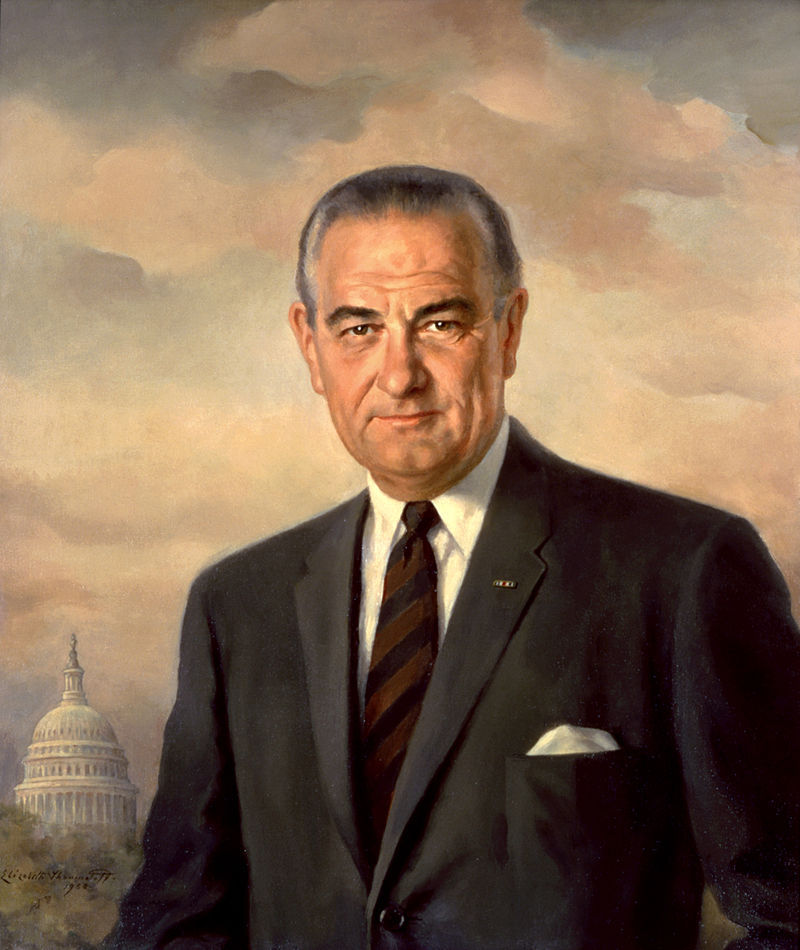
Lyndon Johnson
The 36th President of the United states (working from 1963-1969)
- President Johnson
- Lyndon B Johnson
- LBJ
- Super LBJ
- Intellect
- Leadership

History
Lyndon Johnson had a very long and fairly successful political career. First he served from Texas in the U.S. House of Representaive and later in the U.S. Senate. He tried to get the 1960 Democratic Presidential nomination, even though he had not run in the primaries like Kennedy and Humphrey. However, Johnson's forces were unable to stop Kennedy from getting the nomination on the first ballot. Still, all was not lost for Johnson. Kennedy knew that the 1960 Election was going to be very close and he knew that Texas was virtually a must win state. Hence, over the very strong objection of his brother and key advisor, Robert Kennedy, he offered the Vice-Presidential slot to Johnson and the Texas Senator accepted. The Kennedy-Johnson ticket beat the Nixon-Lodge ticket by a slender 100,000+ margin in the Popular Vote and by a fairly close vote in the Electoral College. Since the margin in Texas was only about 50,000 votes, it seems likely that Johnson's presence on the ticket did make the difference for Kennedy in Texas.
After President Kennedy was assassinated in November of 1963, Johnson was immediately sworn in as President. He chose Minnesota Senator Hubert Humphrey as his running mate at the 1964 Democratic Convention and they went on to win in a landslide over Arizona Senator Barry Goldwater and his running mate Congressman William Miller from New York. Johnson carried 44 of the 50 states. He only lost Goldwater's home state of Arizona and five states in the Deep South. When Johnson signed the Civil Rights Act of 1964, he is reported to have told an aide that he just gave the South to the Republican Party for a generation. Not only did Johnson's prophetic statement come true, but we are now almost two generations from 1964 and the Republicans still control the South. One television commercial stands out from the 1964 campaign and is the most famous/infamous Presidential Election ad ever run on television. It only aired once by the way. It showed a little girl with fowers and then an atomic bomb exploding. The inference was that a vote for Goldwater would be a vote for a dangerous man who could lead the U.S. into a nuclear war with the Soviet Union. Johnson won the Popular Vote in 1964 by a little more than a 20% margin. While Nixon would go on to win in 1972 by a landslide and Reagan the same in 1984, neither of them could quite catch Johsnon's Popular Vote margin over Goldwater, although each of them carried 49 states and thus had greater margins in the Electoral College.
While Johnson is credited for some major domestic achievements, most notably the Civil Rights Act and the establishment of Medicare, his record is spoiled to a great extent due to the division in the country over the Vietnam War and the fact that the U.S. ultimately lost the war and Johnson was the President who had escalated the nation's commitment in the mid-1960's. Johnson decided not to run for re-election in 1968, quite possibly due to the turmoil in the country over the war, though some say that health considerations were a factor.